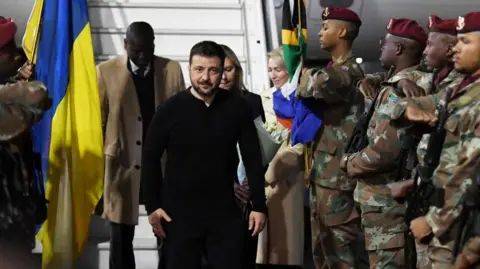Ukraine Leader's Visit to South Africa Marks a Diplomatic Shift
The recent South African trip of Ukrainian President Volodymyr Zelenskyy marks a shift in global diplomacy as it spotlights Ukraine's growing efforts to forge its foreign ties outside of the traditional Western powers. The trip is particularly notable as it represents Zelenskyy's first official visit to the continent of Africa since the commencement of the conflict with Russia in 2022, which is indicative of Ukraine's efforts to form closer relations with nations on the Global South.
Zelenskyy's Pretoria visit and encounter with South African President Cyril Ramaphosa came at a crucial moment. While war persists and peace negotiations are elusive, Ukraine seeks broader support and new diplomatic channels to further its global reputation. The negotiations between the two leaders were focused on finding a peaceful and lasting peace, respect for independence, and the potential of full-scale international dialogue ending the war.
For South Africa, the visit is also important. Being a country that has traditionally remained neutral in world conflicts, particularly in the ongoing Russia-Ukraine conflict, South Africa is setting itself up as a possible mediator. President Ramaphosa has highlighted the need for peace talks without conditions, comparing it to South Africa's own experience of negotiation at the close of apartheid. His stance emphasizes reconciliation and broad-based dialogue, even amid profound divisions.
South Africa has followed an even-handed diplomacy in hosting the Russia-Ukraine war, maintaining relationships with both sides intact. This neutrality has made it possible to engage world powers such as the United States and Russia in dialogue, in an attempt to negotiate peace. Zelenskyy's presence signals a desire to further entrench this mediating role and extend South Africa's diplomatic influence.
The visit also comes at contentious times on the global stage. During Zelenskyy's visit, a devastating Russian rocket and drone attack on Kyiv forced him to cut his visit short. The attack, which took several lives, was a poignant reminder of the pointless violence being visited upon Ukraine and the imperative of a diplomatic solution. It highlighted the complexities of the war, and the difficulties that confront Ukraine in rallying international support while dealing with crises domestically.
There are also tensions looming over the United States. President Zelenskyy has faced criticism for rejecting a proposed peace plan based on territorial compromise, particularly regarding Crimea. This has created tension with significant Western partners. South Africa insists that the visit by Zelenskyy is not intended to mobilize or belong to any geopolitical bloc, but to make contributions towards peace-making through an open dialogue.
Strategically, Ukraine's approaches to South Africa are part of a broader initiative to extend its reach to African nations that have traditionally enjoyed close ties with Russia. Through emerging economic and diplomatic ties, Ukraine attempts to counterbalance Russian interests. This new shift is one where Kyiv has realized that assistance from Africa and other non-aligned nations can become the determining factor in international opinion and policy toward the conflict.
For South Africa, the political risk is complex. While the visit reinforces its role as a international peace broker, it also carries the risk of upsetting long-established relations, particularly with Russia, another BRICS member. Yet the fact that South Africa has offered to host the Ukrainian president is a sign that it is willing to play a more energetic role in world affairs, inspired by its own historic commitment to negotiation and peaceful resolution.
In short, Zelenskyy's visit to South Africa is a significant diplomatic realignment for both nations. For Ukraine, it's an attempt to boost its source of international support and pursue other avenues of peace. For South Africa, it's an opportunity to bolster its position as an even-handed mediator and its diplomatic stature across the globe. As the war continues and international geopolitics change, such exchanges could determine the fate of peacebuilding efforts across the world.




No comments yet
Be the first to share your thoughts!